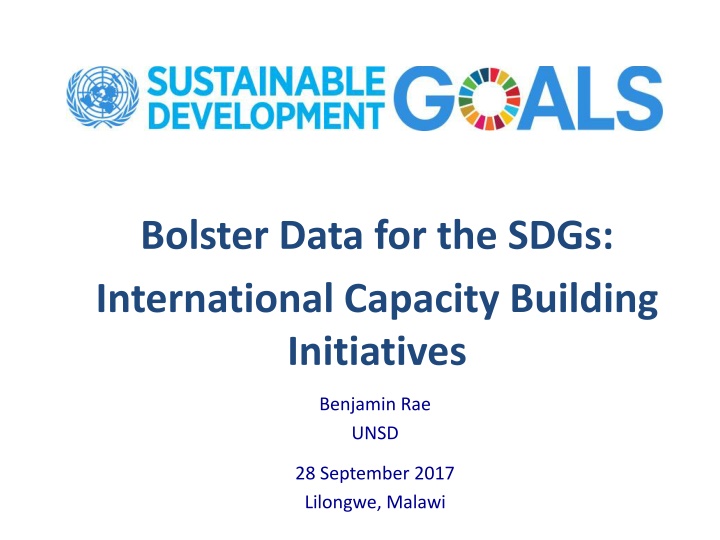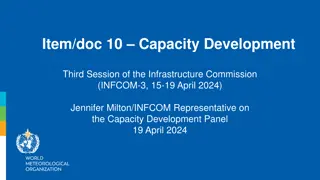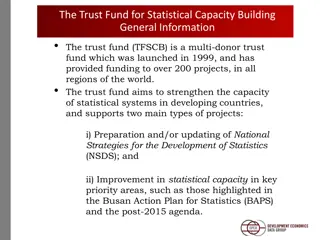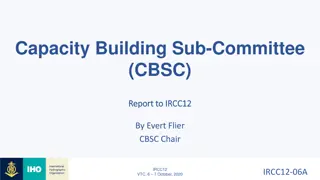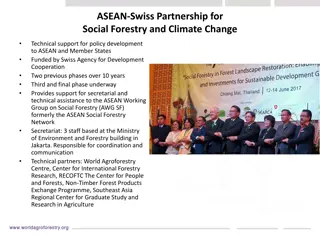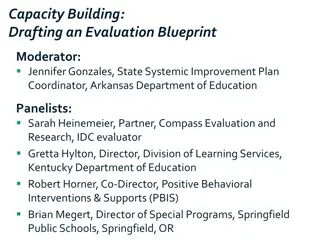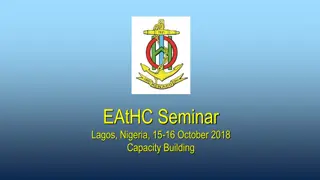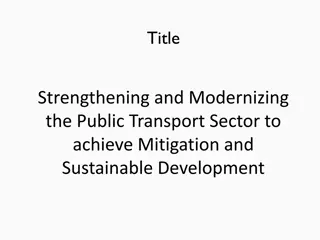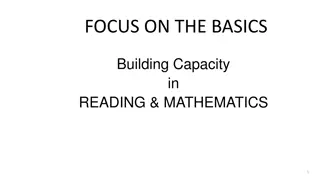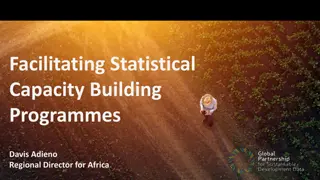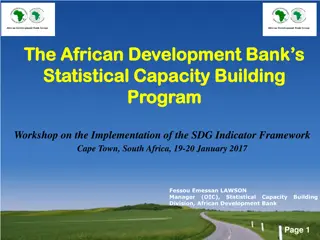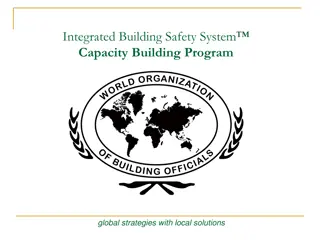Overview of International Capacity Building Initiatives for Sustainable Development Goals
The Cape Town Global Action Plan and the UN World Data Forum are key initiatives aimed at bolstering data for the SDGs. Learn about the frameworks, strategies, and mechanisms in place to enhance statistical capacity building activities for the 2030 Agenda.
Download Presentation

Please find below an Image/Link to download the presentation.
The content on the website is provided AS IS for your information and personal use only. It may not be sold, licensed, or shared on other websites without obtaining consent from the author.If you encounter any issues during the download, it is possible that the publisher has removed the file from their server.
You are allowed to download the files provided on this website for personal or commercial use, subject to the condition that they are used lawfully. All files are the property of their respective owners.
The content on the website is provided AS IS for your information and personal use only. It may not be sold, licensed, or shared on other websites without obtaining consent from the author.
E N D
Presentation Transcript
Bolster Data for the SDGs: International Capacity Building Initiatives Benjamin Rae UNSD 28 September 2017 Lilongwe, Malawi
Overview 1. The Cape Town Global Action Plan and the First UN World Data Forum 2. 10th Tranche Development Account Programme on Data and Statistics for the 2030 Agenda 3. UNSD-DFID Project on SDG Monitoring
The Cape Town Global Action Plan for Sustainable Development Data was adopted by the Statistical Commission at its 48th Session in 2017 Developed by HLG-PCCB Launched at the first UN World Data Forum in Cape Town, South Africa in January 2017
Cape Town Global Action Plan for Sustainable Development Data Framework for the design and implementation of country-led statistical capacity building activities necessary to achieve the 2030 Agenda Proposes key actions under six strategic areas: 1. Coordination and strategic leadership 2. Innovation and modernization of NSS 3. Basic statistical activities and programmes 4. Data dissemination and use 5. Multi-stakeholder partnerships 6. Resource mobilization
UNSC Mechanisms in support of capacity building High-level Group for Partnership, Coordination and Capacity-Building for statistics for the 2030 Agenda for Sustainable Development (HLG-PCCB) Joint sub-group composed of members of both the HLG and the Inter-Agency and Expert Group on SDG indicators (IAEG-SDGs) -- developing a plan to address the immediate priorities for the implementation of the global SDG indicators
Next steps Implementation guide for the CTGAP Coordination of ongoing work in the area of capacity building Follow up on the Objectives of the CTGAP at the Second UN World Data Forum in Dubai, October 2018
First United Nations World Data Forum January 2017 Cape Town, South Africa Over 80 sessions during the three-day event Over 300 speakers and moderators Brought together over 1,500 participants
Programme for the First UN WDF Developed by the Programme Committee Co-chairs Argentina and PARIS21 Consisted of 16 organizations, including three representatives from the HLG-PCCB. Private sector, academia, media, NGOs, etc. Six thematic areas 1. New approaches to capacity development for better data 2. Innovations and synergies across different data ecosystems 3. Leaving no one behind 4. Understanding the world through data 5. Data principles and governance 6. The way forward
10th Tranche Development Account Programme on Statistics and Data (DA10) Objective: countries to measure, monitor and report on the sustainable development goals in an accurate, reliable and timely manner for evidence-based policymaking To strengthen the statistical capacity of developing Principles: Adapt to the needs of the countries and the evolving agenda Build on comparative advantages of the Development Account implementing entities Build on existing initiatives and programmes (coordination) Encourage external participation and funding (partnership)
DA10 Implementing Agencies Global Entities Regional Entities 10th Tranche Development Account Programme on Statistics and Data (DA10) UNSD (DESA) UN Statistics Division UNCTAD UN Conference on Trade and Development UNEP UN Environmental Programme ECA UN Economic Commission for Africa ECE Objective: countries to measure, monitor and report on the sustainable development goals in an accurate, reliable and timely manner for evidence-based policymaking To strengthen the statistical capacity of developing UN Economic Commission for Europe ECLAC UN Economic Commission for Latin America and the Caribbean ESCAP UN Economic and Social Commission for Asia and the Pacific ESCWA UN Economic and Social Commission for Western Asia Principles: Adapt to the needs of the countries and the evolving agenda Build on comparative advantages of the Development Account implementing entities Build on existing initiatives and programmes (coordination) Encourage external participation and funding (partnership) UNODC UN Office on Drugs and Crime UN-Habitat UN Human Settlements Programme
DA10 Implementing Agencies Social & demographic pillar Global Action Plan [HLG-PCCB] Environmental pillar Economic pillar Framework for reflection, planning, and implementation of statistical building programmes to achieve the scope and intent of the 2030 Agenda. Means of Implementation Guidelines to support SDG country reporting [UNDG] Global Indicator Framework [IAEG-SDGs]
DA10 Activities and Deliveries Regional, sub-regional and national workshops / seminars / trainings Expert group / technical group meetings Advisory services / country missions Guidelines / methodology / tools Training material / e-learning / case studies / best practices DA10: budget and timeframe USD 10M Sept 2017 Dec 2019 Subsequent tranches of DA could complement or extend the DA10
4 Pillars of DA10 Pillar 1: Means of implementation Cross-cutting pillar aiming at enhancing capacity of developing countries to strengthen statistical institutional environments and production processes across multiple statistical domains (integration) Pillar 2 4: Statistical domains Sectoral pillars aiming at strengthening capacity in developing countries to measure and monitor sustainable development goal indicators in environment [2], social and demographic [3], and economic [4] statistics areas The social and demographic pillar [3] is subdivided in 4 components: population and demographic statistics; gender statistics; poverty and inequality statistics; and peaceful and inclusive society statistics
DA10: Some Key Activities Under Pillar 1 Opening workshops (Sub-) Regional Workshop on institutional environment, cooperation, dialogue and partnerships for production and utilization of SDG indicators (Sub-) Regional Workshop on data disaggregation (Sub-) Regional Workshop on integration of administrative data, big data and geospatial information for the compilation of SDG indicators Advisory services E-learning platform on Official Statistics
UNSD-DFID Project on SDG Monitoring Purpose: To make Sustainable Development Goals indicators available to the broadest possible audience, and to strengthen the capacity of partner countries in the compilation and use of these indicators.
UNSD-DFID Project on SDG Monitoring Project Countries:
UNSD-DFID Project on SDG Monitoring Major Activities: Research and analysis of country capacities Develop National SDGs Monitoring Strategies Create or upgrade national repositories of SDG indicators Technical assistance; missions; workshops at national and international level; study visits Development of the SDG Data and Visualization Platform/Country Data Lab; setting up automated data exchange
UNSD-DFID Project on SDG Monitoring National Dissemination Platforms: The project will work with each country to identify a suitable statistical dissemination platform Not necessarily limited to SDGs Training in the use of the platform as well as other support will be provided as necessary SDMX Data and Metadata exchange modules will be developed and supported National experts will be trained to enable the NSOs to operate data dissemination and exchange
UNSD-DFID Project on SDG Monitoring User Engagement: Concerns raised over the efficacy of and demand for national dissemination platforms PARIS21 research paints a bleak picture Identifying users and addressing their needs a major feature of the project Lesson learned: NSO staff is one of the most important user groups Dissemination systems tend to see little use by the staff themselves, resulting in a vicious circle of deteriorating quality and reduced interest But user engagement is by no means limited to the NSO staff!
UNSD-DFID Project on SDG Monitoring Metadata: A major focus of the project Key to establishing methodology and quality as well as explaining differences between the international and national datasets The project will assist the countries in the compilation of metadata for SDGs indicators Training, capacity development, and other support will be provided Publication of metadata will be facilitated Nationally and, through SDMX exchange, at the SDGs platform
THANK YOU 21
